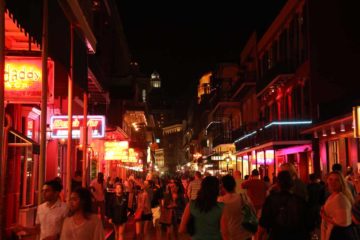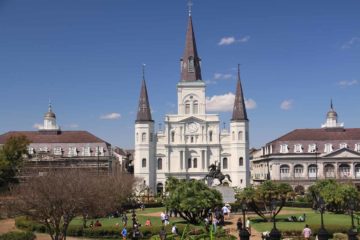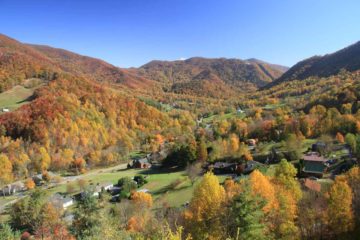About McKinney Falls
McKinney Falls was actually a series of two waterfalls – an upper and lower falls. It could also very well be the only waterfall within the city limits of Austin (Texas’ state capital). Given the heat and humidity that can often times hit the area most of the year (especially the Summer months), we came to the understanding that these waterfalls were really an excuse for locals and visitors to cool off in Onion Creek (as well as Williamson Creek), which the falls flowed on. However, during our visit in early March 2016, much of southern and eastern Texas had been hit with persistent rains that swelled up the creeks and made both waterfalls gush. This was especially the case with the more scenic Lower Falls, which expanded from a segmented 15ft falls with lots of limestone bedrock exposed to an impressively wide contiguous line of water (as shown at the top of this page). Nonetheless, I’d imagine that the way we saw this waterfall would be atypical of what most visitors to this park would see, and swimming in either Onion or Williamson Creeks would not be wise given the high bacterial levels from storm runoff as well as the fast flow of the creeks themselves.
We first began our visit by doing a short 700ft walk from the Lower McKinney Falls car park and trailhead (see directions below) all the way to the waterfall itself. The trail was wide and well-signed from the parking area. A short distance down the slope, we encountered a junction where the left fork followed Onion Creek along the so-called Picnic Trail to the Smith Visitor Center and the Upper McKinney Falls. We kept right at the fork, which then traversed a large field of exposed limestone before it abruptly sloped down to both the base of the Lower McKinney Falls as well as provided access to the brink of the falls. We were able to do this walk in about 30 minutes (and this included the time spent at the waterfall itself in addition to the short walk).
We then resumed our visit by driving to the car park by the Smith Visitor Center (see directions below), then hiking the even-shorter trail down to the brink of the Upper McKinney Falls. This waterfall was much narrower than the lower waterfall so its appearance wasn’t as scenic as the lower one. The base of this waterfall and the banks of Onion Creek also appeared to be not safely accessible, especially since the dropoffs were sheer, and this included an overhanging section where fences were erected to prevent people from trying to walk over the potentially unstable overhang. There was also a picnic area a short distance upstream of the brink of the falls.
There were other trails and picnic areas as well as a pretty big campground within this state park. But since we only focused on the two waterfalls, our visit only was for a little over an hour (especially since we opted not to do the Picnic Trail between the two falls). Nevertheless, for a scenic natural spot like this within the Austin city limits, this rare combination made this place memorable, and it further added to the rather unique allure of the city of Austin, which seemed to us as a city quite unlike any other we encountered in the state of Texas.
Related Top 10 Lists
No Posts Found
Trip Planning Resources
Nearby Accommodations
This content is for members only. See Membership Options.Featured Images and Nearby Attractions
This content is for members only. See Membership Options.Visitor Comments:
Got something you'd like to share or say to keep the conversation going? Feel free to leave a comment below...No users have replied to the content on this page
Visitor Reviews of this Waterfall:
If you have a waterfall story or write-up that you'd like to share, feel free to click the button below and fill out the form...No users have submitted a write-up/review of this waterfall




